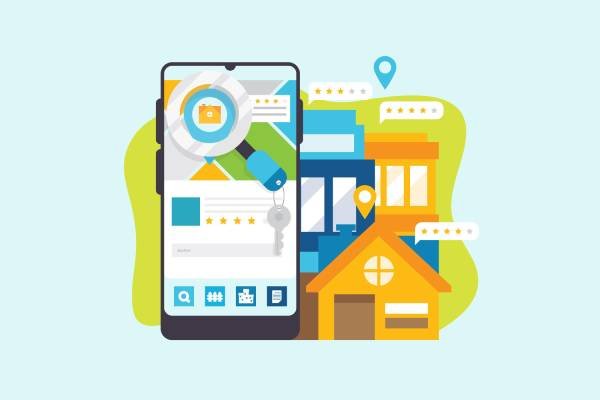Building a Real Estate App: What do you need to know?
In recent years, technology has brought about a sea change in the real estate market, which is currently seeing significant expansion. Real estate businesses have begun to take use of mobile app development in response to the proliferation of smartphones and other mobile devices in order to provide customers with simple access to property listings and other real estate services. Over 2.9 billion people all over the world are using smartphones as of the year 2023, and that figure is projected to rise to 3.8 billion by the year 2026.
Developing an application for the real estate market demands a strategic approach, taking into consideration the one-of-a-kind problems and opportunities presented by the sector. In this all-encompassing guide, we will dissect the most important parts of developing a successful real estate application and walk you through the steps required to get started.
Although having a website might be beneficial for your company, virtually every company today has one. In this post, I'll explain how features designed specifically for mobile devices may add value to not only your company but also to the products and services you offer to your customers. The question of how much it costs to construct a real estate application will be answered once we have a look at the elements that are essential for the success of an app designed for real estate brokers and we will also the importance of collaborating Real Estate Mobile App Development Company.
What are the advantages of developing one's own real estate application?
Increased Accessibility:
When compared to more conventional ways of promotion, using a mobile app allows real estate companies to communicate with a significantly larger number of potential customers. Because mobile apps may be downloaded by virtually anybody who possesses a smartphone or tablet, they are available to users located in virtually any part of the world.
Enhancements Made to the User Experience:
Users of a real estate app that has been thoughtfully built can benefit from a streamlined experience that makes it simple for them to search for available properties and make appointments. This has the potential to result in greater levels of satisfaction and loyalty among customers.
An increase in revenue:
Real estate applications can assist real estate professionals in making more sales by offering customers with an uncomplicated way to look for available homes. Users are more likely to follow through on their interest in a property if the app allows them to arrange appointments and contact agents directly from within the app.
Advantage over Competitors:
Companies who provide mobile apps have a substantial edge over competitors that do not provide such services as the real estate industry continues to become increasingly competitive. Real estate companies have the opportunity to differentiate themselves from their rivals by providing consumers with a method of searching for available properties that is both easy to use and convenient.
Gaining an Understanding of the Real Estate Market:
Before getting into the complexities of app development, it is very necessary to have a solid foundational knowledge of the workings of the real estate market. Recognize the different requirements that buyers, sellers, and real estate agents have in this transaction. A real estate app needs to be able to fulfill a range of functions, from listing properties and providing virtual tours to performing financial calculations and producing legal documentation.
1. An Easy-to-Navigate User Interface:
Any app that is going to be successful needs to have a user interface that is fluid and easy to understand. Enhance the user experience by ensuring simple navigation, a rapid search for available properties, and a design that is visually appealing. When doing a thorough investigation of available properties, it is advisable to make use of filters, various sorting options, and interactive maps.
2. Specifics and Listings of Available Properties:
Establish a sizable database of property listings that contains as much information as possible. Users will benefit from having access to a more in-depth look of each property if you provide high-quality pictures, floor plans, and virtual tours. Create a search algorithm that enables customers to filter homes according to location, price range, amenities, and any other relevant factors that you deem to be important.
3. More In-Depth Search Options and Filters:
Provide users with an advanced search functionality to enhance their experience. Include more advanced filters such as the type of home, its size, the number of bedrooms it has, and its closeness to other facilities. A tailored search experience increases user happiness and makes it easier for users to locate real estate that is in line with their unique interests.
4. Multimedia Content and Interactive Virtual Tours:
Include interactive multimedia content and immersive virtual tours in order to deliver a genuine experience of the available properties. Features that utilize virtual reality (VR) and augmented reality (AR) can make the user experience more enjoyable by enabling prospective purchasers to virtually walk through homes and imagine spaces before committing to a purchase.
5. Financial Tools and Calculators, Such as Mortgage Calculators:
Integrating mortgage calculators and other financial tools into your platform will make it easier for consumers to organize their finances. Give consumers the ability to calculate their estimated monthly mortgage payments, property taxes, and other associated fees right within the app. Providing consumers with access to these tools not only provides value but also helps them make decisions based on accurate information.
6. Personalization and Accounts for Individual Users:
Create user accounts in order to make customisation possible. Users should be able to select preferences, remember favourite listings, and receive customized property recommendations based on their previous search history. Providing users with a more tailored experience boosts engagement and encourages them to keep coming back to the app.
7. Messages, Message Alerts, and Notifications:
Users should always be kept up to date with timely notifications and alerts. Please keep them updated on any new listings that meet their requirements, any price reductions, and any forthcoming open houses. Users are more likely to remain engaged and to take advantage of opportunities that are pertinent to their needs if an efficient notification system is in place.
8. Safe Financial Transactions and Documentation for Legal Purposes:
Integrate safe payment gateways for transactions and give a risk-free setting in which consumers can conduct their financial business. In addition, capabilities should be included for the storage and retrieval of legal documentation pertaining to property transactions. This should be done to ensure both transparency and compliance.
Which Technologies Should Be Employed When Creating an Application for Real Estate
One of the most important steps in the process of development is making the choice of which technology stack to use. Think about things like the scalability of your software, how secure it is, and the features that you want it to have. A real estate application's technological stack typically includes the following main components:
Frameworks for the Front End:
When it comes to constructing the user interface of your application, select a dependable frontend framework such as React or Angular.
Backend Development:
Choose a backend technology to handle server-side functionality, database operations, and user authentication. Some examples of backend technologies include Node.js and Django.
Database
Choose a dependable database management system, such as MySQL or MongoDB, to effectively store and retrieve the data pertaining to the properties you own.
Cloud Services:
Consider utilizing cloud services such as Amazon Web Services or Microsoft Azure to optimize your system's scalability, storage, and general performance.
APIs:
Your app's functionality can be improved by using APIs (application programming interfaces) from third-party providers for services such as mapping, financial calculations, and virtual tours.
Do You Want to Discuss Your Idea for the Development of a Real Estate Mobile App?
The market is experiencing rapid expansion at the moment. Mobility has replaced previous norms as the new standard in today's rapidly changing world. Without a mobile app, a successful real estate business is nearly impossible to picture in today's world. It's possible that currently, on-demand applications have surpassed the construction of websites. Those who are considering establishing a mobile app for real estate should be aware that there is a good chance they will encounter obstacles that will prevent them from moving forward. These include a very competitive industry, expensive real estate mobile app development, need for a high level of security, and a shortage of hard skills.
The Real Estate Mobile App Development Company will undoubtedly be of assistance in the process of creating the application that is necessary.
They will assist you in doing an in-depth examination of the industry as a whole, including the companies that are in direct competition with you. Conduct an analysis of the current trends using
the available statistics. Take a peek at some existing apps for inspiration while developing your own real estate app. The next step is to design and create a prototype of the product.
The process of developing a real estate web application does not begin until after this step has been completed. Keep in mind that releasing a product is not the final stage in the process. In addition to this, they will give ongoing support, which, along with the addition of new features, is of equal significance. It's possible that taking all of these measures will seem like a difficult task. On the other hand, you shouldn't try to handle everything all by yourself!

Read more blogs

Time and Cost of Developing an AI like ChatGPT: Key Factors Explored
Explore the factors influencing the time and cost of developing an AI model like ChatGPT. Understand key considerations for successful AI ap

Guide to Successful Real Estate App Development: Features, Technologies, and More
Explore the advantages of developing a real estate app, key features, technologies to employ, and the importance of collaborating with a Rea

Custom vs. Template-Based Website Development: A Comprehensive Cost Comparison Guide
Explore the costs, pros, and cons of custom website development vs. template-based solutions. Make an informed decision for your online pres